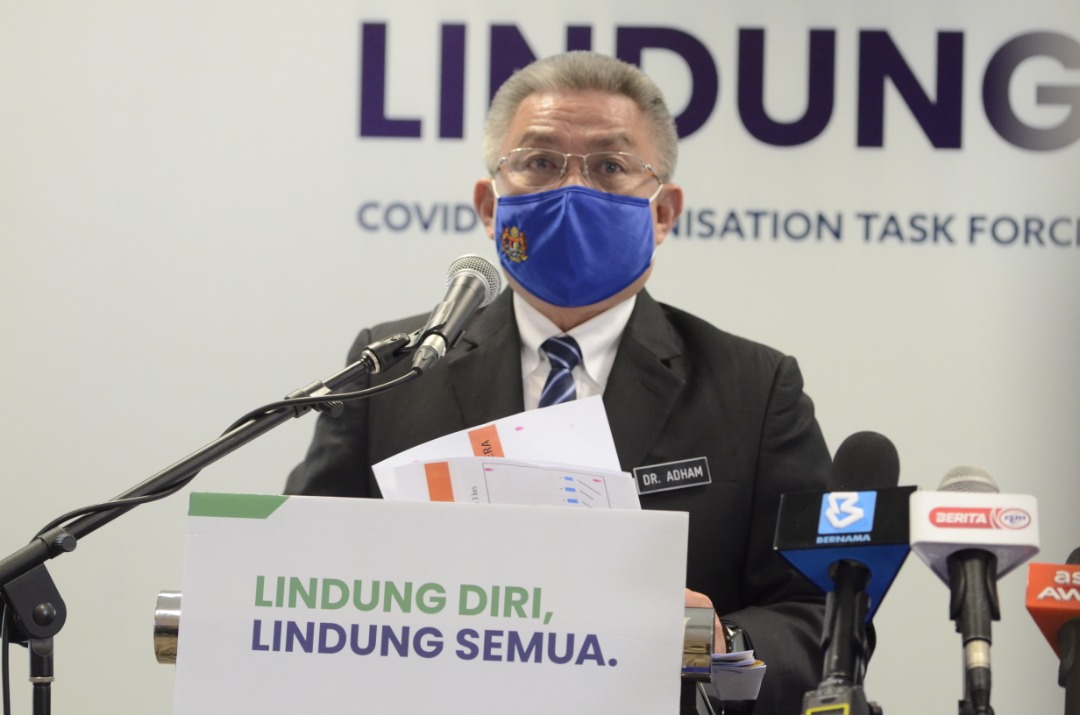KUALA LUMPUR, March 22 — About 66 per cent of 19,936 Covid-19 cases reported over the last two weeks in Malaysia were sporadic, Health Minister Dr Adham Baba said today, indicating widespread community transmission.
During a joint press conference by the Covid-19 Immunisation Task Force (CITF) this afternoon, the health minister said that between March 8 and March 21, a total of 13,185 positive Covid-19 cases reported were sporadic, while 6,751 cases were linked to clusters.
“That means, within two weeks, we have 66 per cent cases which are sporadic and 33.8 per cent which belong to clusters,” Dr Adham said.
A sporadic infection is a positive Covid-19 case whose origin is unknown and not linked to a cluster. The World Health Organization (WHO), in its March 1 Malaysia Covid-19 situation report, observed “large-scale community transmission” nationwide from February 22 to 28, despite a reported 11 per cent decrease in reported new infections that week from the previous week.
The 20.8 per cent proportion of unlinked cases was lower than the previous week, “but still high”, said WHO. WHO also noted that several states and territories in Malaysia appeared to face large-scale community transmission of the virus, with several states reporting sporadic coronavirus infections at more than 35 per cent.
Dr Adham said today that the Ministry of Health (MOH) has increased screening for Covid-19 in the community not only by increasing the number of tests, but also by increasing the capacity of private and government labs that can process the RT-PCR test.
“We also have sentinel clinics that screen cases that come in with or without symptoms, influenza-like illness we screen, severe acute respiratory illness we screen, and we also carry out pre-operative surveillance, and for those admitted into hospital.
“Those are the ways we have expanded our testing,” the health minister said.
Besides targeted screening, Dr Adham said the government, along with the Social Security Organisation (Socso), have also expanded Covid-19 screening among construction and manufacturing workers.
“We also have a strategic plan to ensure that if there are cases that have the potential to cause an outbreak — we will set up a rapid response team and a rapid assessment team. Besides that, we give 200 general practitioners the authority to issue a home surveillance order (HSO) to positive cases and those who need to be quarantined,” Dr Adham added.
Dr Adham said that the government has come up with five strategies to “flatten the curve” of Covid-19 infection during the country’s state of emergency scheduled until August.
Technically, Malaysia has already “flattened the curve”, especially after the Movement Control Order this year, where the number of reported Covid-19 cases are not high enough to overwhelm the health care system.
The first strategy, according to Dr Adham, is to reduce the number of daily Covid-19 cases to below 500 and to reduce the number of sporadic cases.
Secondly, reduce morbidity and mortality, especially preventing deaths among the higher-risk groups. Thirdly, strengthen Covid-19 diagnostics and screening.
Fourthly, achieve herd immunity by vaccinating 70 to 80 per cent of the population and finally, by increasing awareness of new norms and standard operating procedures among the public.








